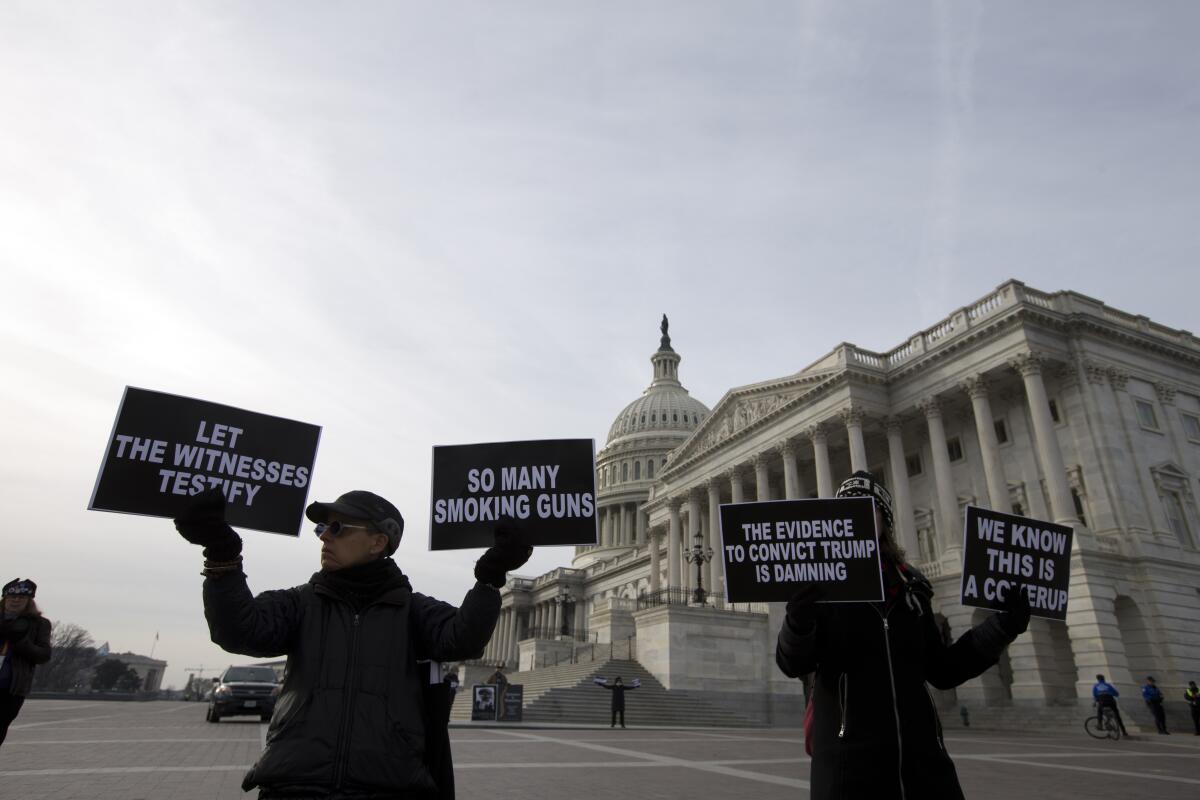Newsletter: Why impeachment feels oddly reassuring

- Share via
Good morning. I’m Paul Thornton, and it is Saturday, Jan. 25, 2020. Let’s take a look back at the week in Opinion.
After coming frighteningly close to war with Iran, it feels oddly relieving to watch members of Congress explain for a week why the president poses such a grave threat to our national security and constitutional order that he must be removed from office.
Of course, it bolsters no one’s faith in government to see senators demur over considering new evidence of the commander in chief’s thuggish behavior — behavior from which only the Senate, by virtue of its power to remove him, can protect us — but I’ll take continued indifference to President Trump’s authoritarianism over another war in the Mideast. (And really, I cannot recommend enthusiastically enough Andrew J. Bacevich’s commentary on that topic, no matter how old it might be.)
A cure for the common opinion
Get thought-provoking perspectives with our weekly newsletter.
You may occasionally receive promotional content from the Los Angeles Times.
So let’s ignore for a moment the frightening instability in the rest of the world so we can get a true sense of the magnitude of this moment: The president is on trial for high crimes and misdemeanors, no one can seriously dispute that Trump did everything for which he was impeached, and yet senators will almost certainly decline to exercise their oversight authority.
Most puzzling, as columnist Virginia Heffernan points out, is that Republicans were agitating for impeachment before Trump took office: “The dynamism the party once showed, when it dared to condemn Trump in 2016, is gone. In more courageous days, Republicans started this impeachment. Too bad they won’t see it through.”
Trump’s presidency won’t end with impeachment, but it won’t end well either, writes Jonah Goldberg. The reason: Character is destiny, and Trump’s character won’t allow him to govern as a servant of the people. As for those who love the way he governs, they don’t have to worry about the ugly facts of his crookedness, because their favorite news channel doesn’t mind ignoring the president’s trial, notes Brian A. Boyle. And if Democrats want the Senate to hear all the evidence of Trump’s Ukraine extortion, they should jump at the chance to accept a Bolton-for-a-Biden testimony deal, says Jon Healey.
Even under impeachment, Trump provides fresh evidence of his corruption. The president flew to south Florida this week to address the Republican National Committee at Trump National Doral Miami. Yes, that’s the president’s golf resort, where he notoriously tried to steer next summer’s G-7 summit of international leaders. “Trump’s self-dealing is of a piece with the behavior he’s been accused of in the impeachment inquiry,” says the L.A. Times Editorial Board. “It’s all about using the power of the presidency for his personal benefit.” L.A. Times
It’s 1856 all over again, and that isn’t a good thing. The first Republican Party presidential candidate, John C. Frémont, came from California, and in 1856 he was one of the most admired Americans. But Democrats’ fear of losing forever gave rise to scare-mongering and outright lies over the nascent party that would go on to put Abraham Lincoln up for election. James Buchanan beat Frémont and quickly set about entrenching his party’s pro-slavery agenda in Washington. The results were disastrous and carry ominous lessons for Americans today. New York Times
Enjoying this newsletter? Consider subscribing to the Los Angeles Times
Your support helps us deliver the news that matters most. Become a subscriber.
Good news: If you have a blocked artery, you probably don’t need a stent. Bad news: Your doctor might not tell you. Decisive evidence has emerged showing that angioplasty and stents are no better at preventing heart attacks in patients with blocked arteries than noninvasive and inexpensive medications. But the angioplasty-and-stent treatment is so deeply embedded in medical culture that physicians reflexively perform it despite knowing the risks and questionable effectiveness, says cardiologist Rita F. Redberg. Plus it’s expensive, and doctors are rewarded for performing procedures. L.A. Times
Why is the Trump administration going after UCLA? A student was deeply offended when a guest lecturer in an anthropology class asserted that Israel engaged in ethnic cleansing against Palestinians. A conservative Israel advocacy organization complained to the federal government, saying the student was a victim of discrimination and harassment, and the Justice Department said it would investigate. This poses a serious risk to free and open expression on college campuses, even if it makes people uncomfortable, write David N. Myers, a Jewish history professor at UCLA, and Rabbi Chaim Seidler-Feller. L.A. Times
Stay in touch.
If you’ve made it this far, you’re the kind of reader who’d benefit from subscribing to our other newsletters and to the Times.
As always, you can share your feedback by emailing me at paul.thornton@latimes.com.
A cure for the common opinion
Get thought-provoking perspectives with our weekly newsletter.
You may occasionally receive promotional content from the Los Angeles Times.







